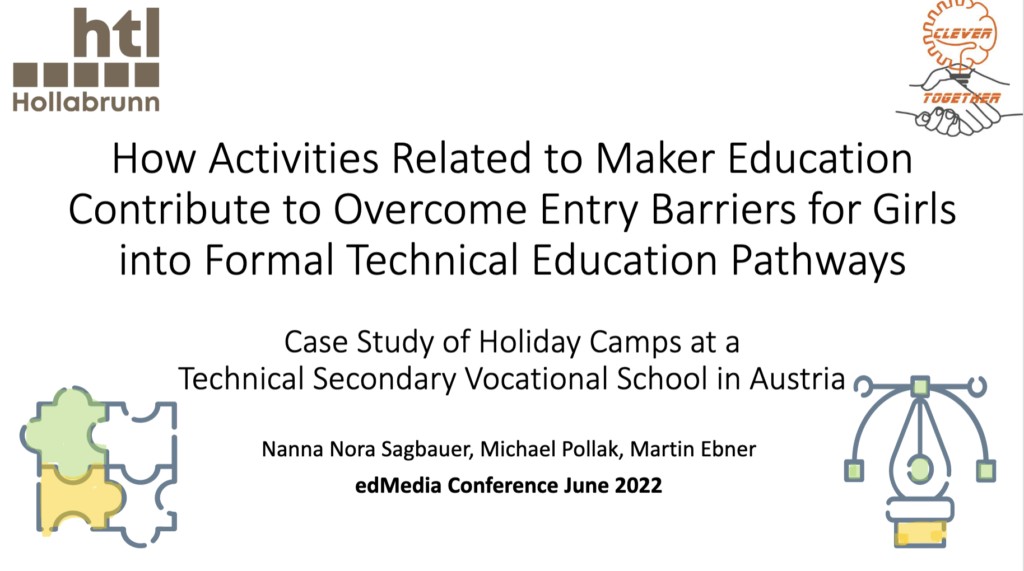Im Rahmen der Veranstaltungsreihe «Bildung und Digitaliät» der PH Zürich wurde ich eingeladen rund um das Thema MOOCs & OER zu reden. Herausgekommen sind diese Folien:
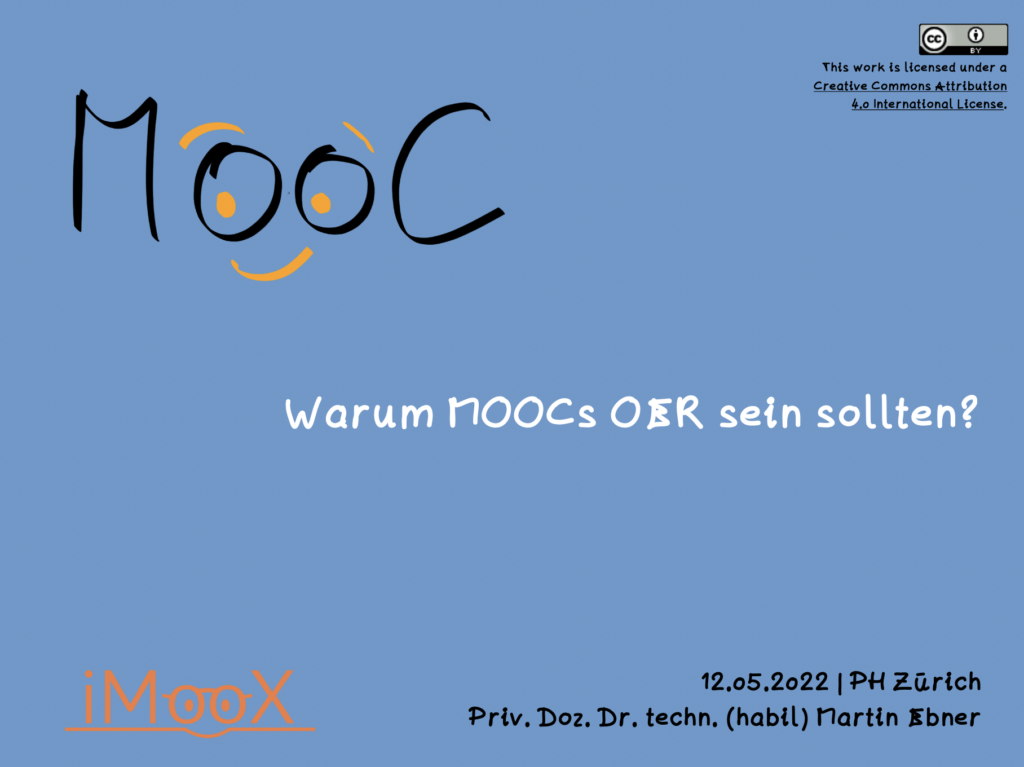

Digitale Lehre an und rund um der Technischen Universität Graz
Im Rahmen der Veranstaltungsreihe «Bildung und Digitaliät» der PH Zürich wurde ich eingeladen rund um das Thema MOOCs & OER zu reden. Herausgekommen sind diese Folien:

Wir freuen uns, dass wir unsere Präsentation rund um digitale Kompetenzen in der Erwachsenenbildung auf dem 28. DGfE-Kongress mit dem Thema ENT | GRENZ | UNGEN vorstellen konnten. Die Präsentation war Teil mehrerer Vorträge der AG Digitalisierung in der Erwachsenen- und Weiterbildung: Potenziale digitaler Medien für Zugänge zu Weiterbildungsangeboten.
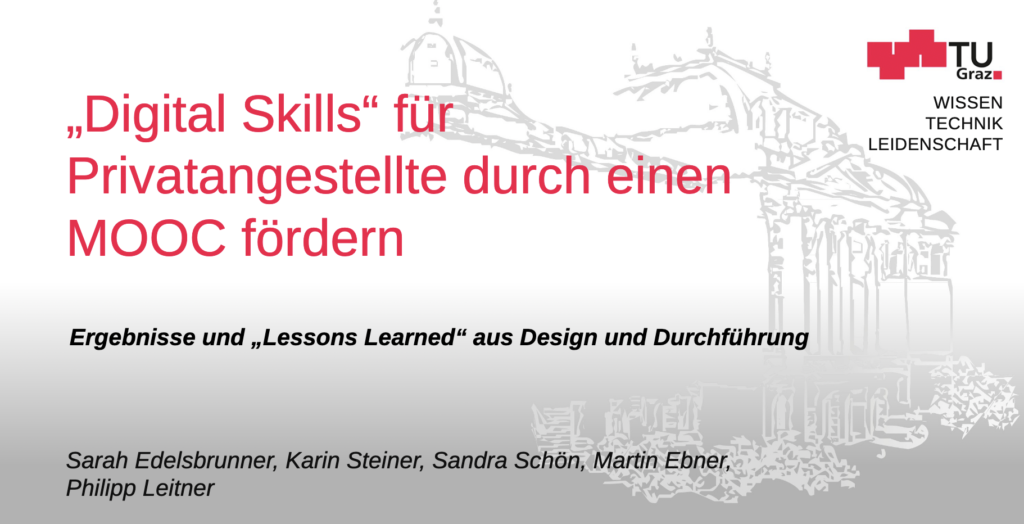
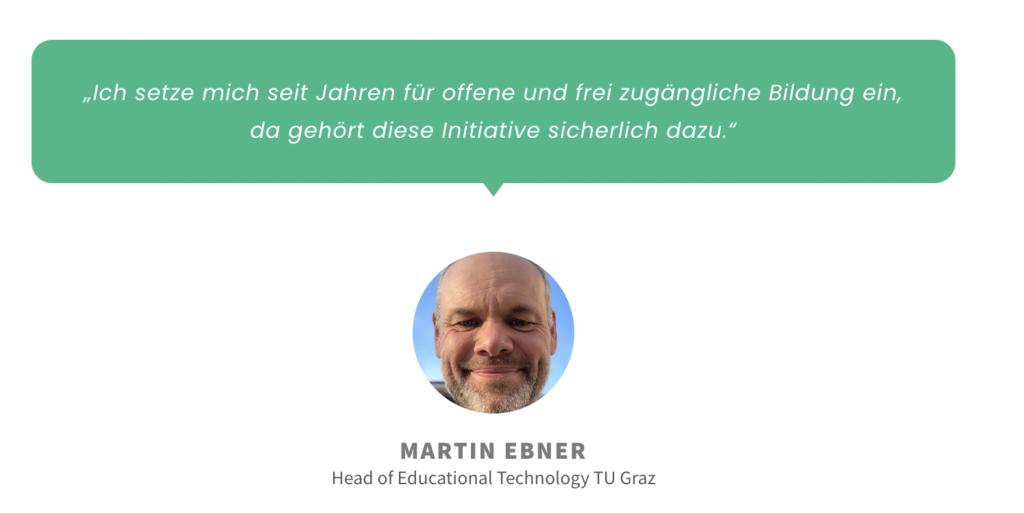
Der Bildungsmobilfunker educom meldet, dass er nun bereits über 3.000 Bildungswebseites „frei geschalten“ hat. Frei bedeutet dabei, dass kein Datenvolumen angerechnet wird, wenn man Inhalte dieser Webseit konsumiert. Natürlich macht da auch gerne die TU Graz mit und hat neben seinen Webportalen auch iMooX.at dort angemeldet. Wir freuen uns natürlich über solche Aktionen und hoffen auf weitere Nachahmer:innen:
Hier geht es zur offiziellen Webseite von free e-Learning, hier gibt es noch eine Pressemeldung hierzu.
Our contribuation to this year ED-Media 2021 conference about „Making of an Open Makerspace in a Secondary Vocational School in Austria: Development, Activities, User Behaviour and Gender Balance“ got published. The slides are already here online.
Abstract:
This research shows the development process of an open makerspace on the premises of a higher secondary vocational school (HTL) in Austria from 2017 till today. It illustrates the need for this space, the acquisition of initial funding and the legal framework. User policy and machinery are presented, as well as safety and security systems. An insight on the organizational structure is given. We present regular dedicated maker classes and curricular integration of the makerspace for K-12 students. Makerspace activities like maker challenges and holiday camps for divergent participants like primary school children and girls are discussed and the role of females in engineering education and makerspaces is reviewed. Qualitative observations of different stakeholders are reproduced and supplemented by statistical data. We also show setbacks and difficulties due to the Corona crisis and give an overview of future maker initiatives.
[draft @ ResearchGate]
[final publication @ lerntechlib]
Reference: Sagbauer, N.N., Stocker, K., Pollak, M. & Ebner, M. (2021). Making of an Open Makerspace in a Secondary Vocational School in Austria: Development, Activities, User Behaviour and Gender Balance. In T. Bastiaens (Ed.), Proceedings of EdMedia + Innovate Learning (pp. 467-479). United States: Association for the Advancement of Computing in Education (AACE). Retrieved August 1, 2021 from https://www.learntechlib.org/primary/p/219695/.
Togehter with my colleagues we did a research about OER policies in Higher Education with a strong focus on Germany, Austria and Switzerland for the Asian Journal of Distance Education:
Abstract:
The 2019 UNESCO recommendation on Open Educational Resources (OER) encourages member states to monitor policies and mechanisms in OER across the world. In higher education, there are many initiatives and policies around OER. This contribution gives insights into the current situation concerning OER policy documents that are of national or institutional relevance for public higher education institutions in Germany, Switzerland, and Austria. For each country, a different approach for identifying OER policy documents was chosen, dependent on the availability of documents and different dominant forms of documentation. Whereas digital documents available on the web were found as helpful sources for Germany, and performance agreements between the national ministry and individual universities were used for analysis in Austria, a survey amongst all universities was the chosen research approach in Switzerland to give an overview about potentially OER related policy documents. All these documents are now made available via the OER World Map. With this contribution, the authors also highlight the possibility of using the OER World Map as a powerful tool to collect and evaluate OER policy documents.
[full paper @ journal’s Homepage]
[full paper @ ResearchGate]
Reference: Neumann, J., Schön, S., Bedenlier, S., Ebner, M., Edelsbrunner, S., Krüger, N., Lüthi-Esposito, G., Marin, V. I., Orr, D., Peters, L. N., Reimer, R. T., & Zawacki-Richter, O. (2022). Approaches to Monitor and Evaluate OER Policies in Higher Education – Tracing Developments in Germany, Austria, and Switzerland. Asian Journal of Distance Education.
I just wrote a short essay about „MOOCs and their Role for Future Education“ for the Education Technology Insight Magazin (website). The original article has been published on their website.
[Link to article]
[article @ ResearchGate]
Reference: Ebner, M. (2021) MOOCs and their Role for Future Education. Education Technology Insights. https://distance-and-remote-learning-europe.educationtechnologyinsights.com/cxoinsights/moocs-and-their-role-for-future-education-nid-1525.html
 Issue 17(12) of our journal on emerging technologies for learning got published. Enjoy the readings as usual for free :-).
Issue 17(12) of our journal on emerging technologies for learning got published. Enjoy the readings as usual for free :-).
Table of Contents:
Nevertheless, if you are interested to become a reviewer for the journal, please just contact me 🙂 .
I am happy to be part of a very interesting program as guest lecture called „MSc in Immersive Technologies – Innovation in Education, Training and Game Design“ – distributed by the International Hellenic University.
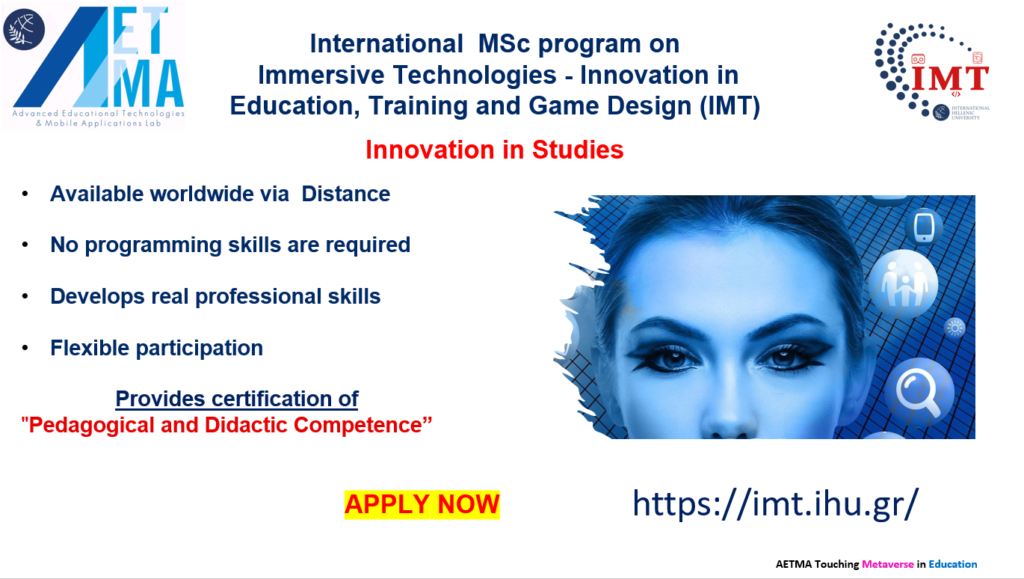
The good news are, that the master will start again and you can apply for till July 10th 2022:
[Link for detailed information]
Es freut mich sehr, dass wir im Rahmen des „Zertifikat für Hochschullehrende Bildung für Nachhaltige Entwicklung“ auch einen Beitrag leisten können – nämlich rund um Open Educational Resources.
Persönlich find ich, dass das ein guter und wichtiger Schritt ist auch in der Hochschullehre gezielt darüber nachzudenken,einfließen zu lassen und damit auch eine Veränderung herbei zu führen.
Das ganze Programm, den Ablauf und auch die Teilnahembedingungen sind auf der Homepage hier abrufbar. Freue mich schon sehr auf unseren bescheidenen Beitrag im Dezember.
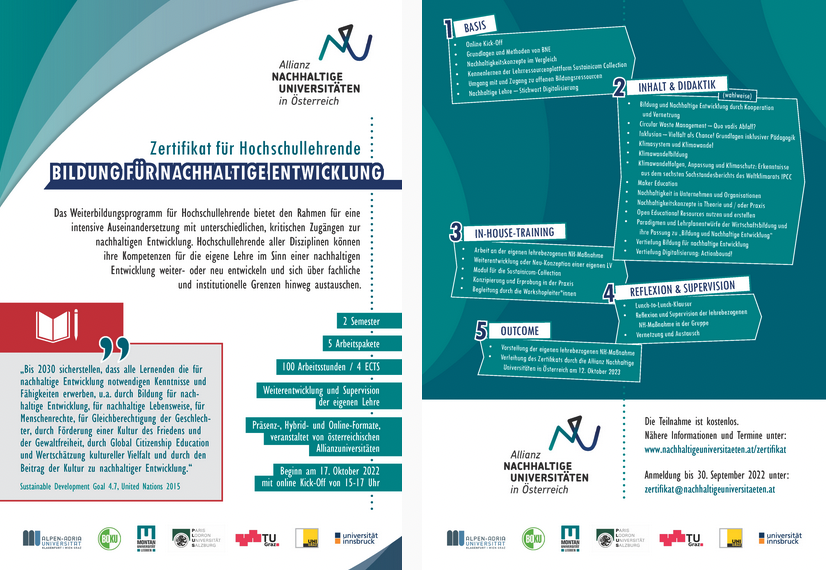
[Zertifikat „Bildung für Nachhaltige Entwicklung“]
[Flyer .pdf]
We are happy to present our research about „How Activities Related to Maker Education Contribute to Overcome Entry Barriers for Girls into Formal Technical Education Pathways – Case Study of Holiday Camps at a Technical Secondary Vocational School in Austria“ at EdMedia + Innovate Learning 2022 conference.
Find here our slides of the talk:
